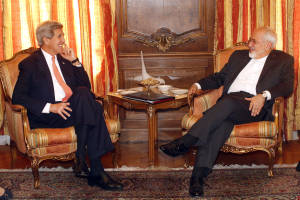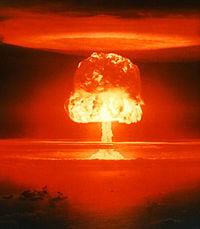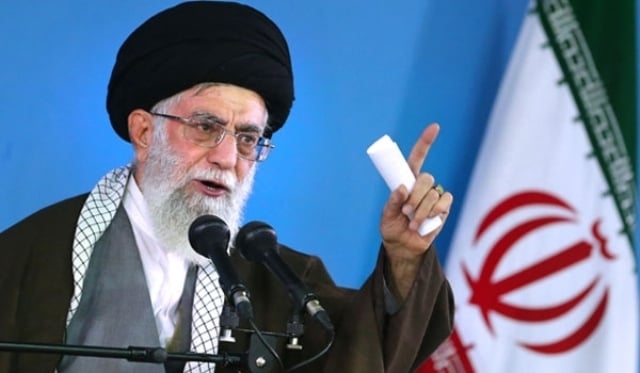A week away from the deadline for a nuclear agreement, Iran is toughening its demands and the talks have apparently come to a standstill.
With only a week left for the negotiations between the P5+1 Powers and Islamic Republic, Iranian Supreme Leader Ayatollah Ali Khamenei is toughening his stance and has presented a list of demands that are seemingly unacceptable to the US-led negotiating parties.
Khamenei declared on Tuesday that Tehran will neither agree with a 10-year-long restriction on its nuclear activities nor accept UN International Atomic Energy Agency (IAEA) monitoring of its nuclear program as acceptable terms for a deal.
“The Americans are seeking to destroy Iran’s nuclear industry and on the opposite side everyone in Iran, including me myself… are after a good agreement, that is a fair, just and honorable deal in line with Iran’s interests, while stressing on (the country’s) redlines,” the Khamenei stated, according the Iran’s Fars News Agency (FNA), while addressing heads of state and military officials.

Iran’s nuclear plant in Bushehr. (AP/ISNA, Mehdi Ghasemi)
Referring to the nuclear talks, he said the US, having been left with no other option, was forced to negotiate with Tehran, since “all its heavy pressures on Tehran had failed to bring the country to its knees.”
Khamenei again demanded that all sanctions against Iran be terminated immediately after the signing of an agreement, and he accused the US of consistently shifting its demands, saying, “The Americans changed the six months to one year first, and then lengthened the negotiations by making repeated excessive demands and even threats to boost the sanctions and speaking of militarism.”
The US maintains that that the sanctions should be removed in tandem with Iran’s compliance with the agreement.
“Contemplation and study over the trend of the demands made by the Americans shows that they aim to uproot Iran’s nuclear industry and the country’s nuclear essence and change it to a caricature and a window without a content,” Khameini charged. “The Americans mean to destroy Iran’s nuclear industry…and somehow keep the pressures and sanctions at the same time.”
Khamenei claimed that Washington’s main objective was to make Iran surrender and become a dependent nation, especially “considering that Iran is a role model for other countries,” and that the Americans “renege and bargain so frequently and break their promises so often for the very same purpose.”
The Iranian supreme leader demanded that Iran be allowed to continue with its nuclear research and development. “They say that we shouldn’t do anything in the 12-year period, but this a doubly wrong and bullying word.”
He restated Iran’s opposition to UN inspections of Iran’s nuclear past. “We oppose the condition that fulfillment of the opposite side’s undertakings depends on the IAEA (verification) report because the Agency has proved time and again that it is not independent and fair; hence we have a pessimistic view about it,” he said.
He then reiterated his defiant opposition to “unconventional inspections, interrogation of Iranian figures and inspection of military centers,” citing them as redlines. “We are seeking to remove the sanctions, but we see them as an opportunity from a different angle because they have caused us to pay more attention to domestic forces and capacities,” he added.
Stalemate in Negotiations

US Secretary of State John Kerry (L), meets with Iran’s Foreign Minister Mohammad Javad Zarif. (AP/Jason DeCrow)
According to FNA, the latest reports from the negotiations indicate that the issue of the removal of the sanctions has slowed down progress in drafting a final deal. Western diplomats have made similar comments.
“The differences which exist on the text of [a final] agreement have lessened, but progress is not made as expected,” Iranian Deputy Foreign Minister and deputy lead negotiator Abbas Araqchi said Monday in an interview with the Iranian state TV.
The July 1st deadline is not the final date for an agreement, and the seven delegations would hold talks for a few more days beyond the deadline if necessary, he added.
A few hours later, Iranian Foreign Minister Mohammad Javad Zarif also said that Tehran was determined to reach a final deal with the P5+1, however, the “opposite side” was making excessive demands.
“All negotiating sides should avoid excessive demands and allegations outside international frameworks to pave the way for achieving an agreement,” Zarif told reporters upon his arrival in Luxembourg on Monday.
In response to the allegedly enormous presented by Western powers in the nuclear talks, the Iranian parliament approved a bill on Tuesday that requires the government to “protect the country’s nuclear rights in its negotiations with the world powers.”
Iranian legislators voted for the bill, which also underlines the necessity for safeguarding the country’s nuclear achievements.
The agreement is valid, according to the bill, only if there is “full and total removal of sanctions” that “should be implemented on the same day that Iran will start doing its undertakings.”
The IAEA is allowed to make “routine and usual visits” to the nuclear sites, while access to the military, security and sensitive non-nuclear places is forbidden.
No limitation should be place on Iran’s nuclear research and development, the Iranian parliament declared in the bill.
By: Max Gelber, United with Israel

Sign the Petition to Stop a Nuclear Iran
The US Congress must ensure that sanctions against Iran remain in force until the nuclear threat is completely eliminated.
I strongly oppose easing sanctions before the nuclear threat from Iran has been eliminated. Allowing Iran to enrich uranium without being subject to 'anytime, anywhere' inspections is extremely dangerous and unacceptable. Iran's nuclear program must be stopped.
See our Privacy Policy